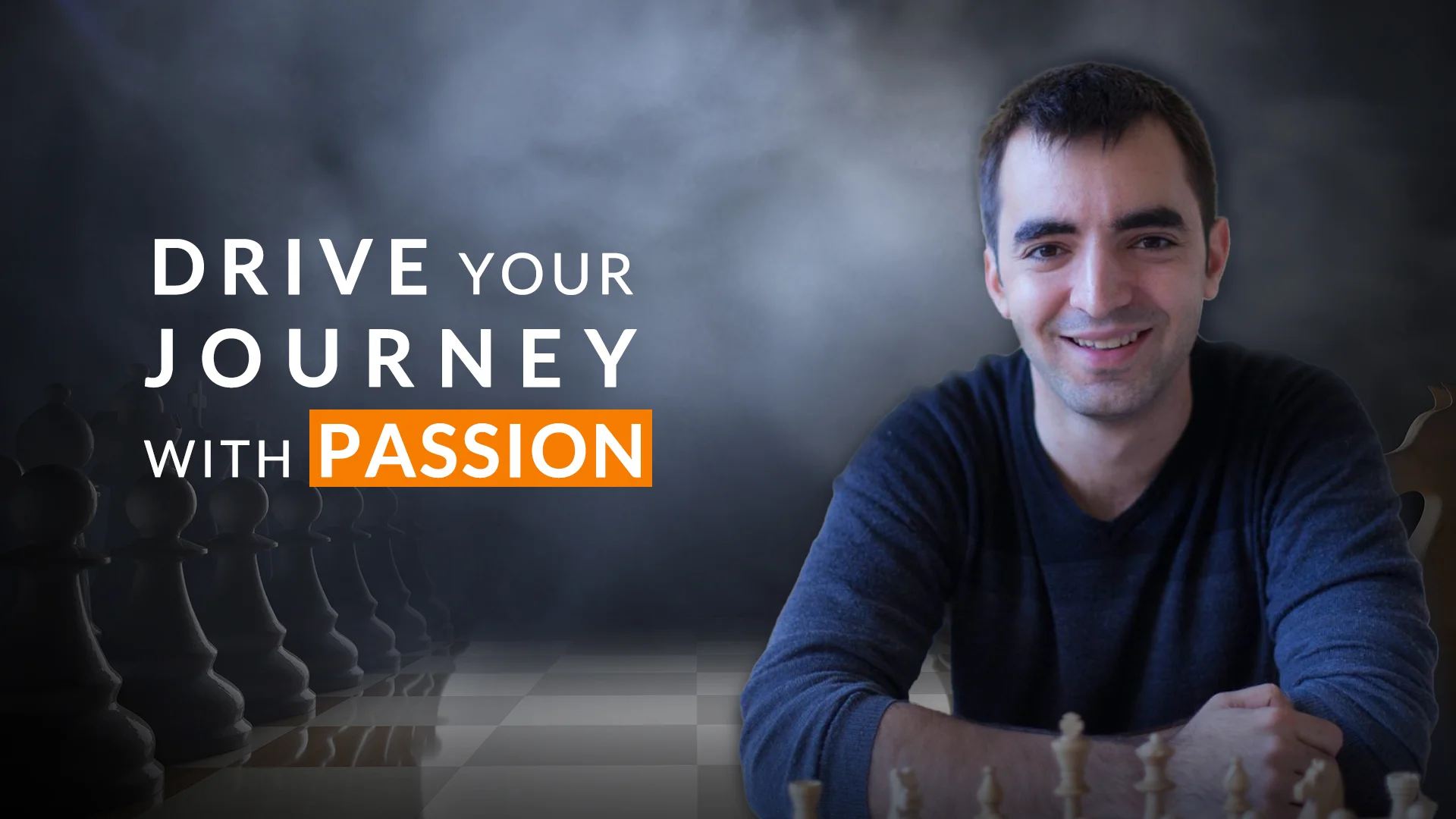The Eric Rosen Approach: How to Use Passion to Find Success
Discover IM Eric Rosen’s incredible journey as he pursued his passion and became a successful chess content creator.
Discover IM Eric Rosen’s incredible journey as he pursued his passion and became a successful chess content creator.

Most people choose to follow the traditional way. It’s safe and comforting. The society approves of it.
Then there are some like IM Eric Rosen, the famous chess streamer who put new life into the Stafford gambit.
They experiment and follow their heart, be it in chess or in life.
At first, society laughs at them.
But with their courage, they carve out their own path. Then no one laughs. And everybody wants to experiment with their gambits🙂
IM Eric Rosen’s chess journey started in the Bahamas, as he shared in the ChessMood podcast with GM Avetik.
"I was 7 years old when, on a family vacation, my older brother taught me how to play."
"At 8, I attended my first chess camp by Tamara Golovey, the childhood trainer of Grandmasters Boris Gelfand and Yuri Shulman. She really gave me a strong foundation for the game and helped me improve up until the amateur level of 1600 to 1700."
Eric kept progressing and one of his important milestones came in 2011.
“It was the first time I won the National Scholastic Championship. My high school had a special day in my honor. The town I grew up in, Skokie, Illinois, also had an Eric Rosen Day (16th May 2011). The mayor made it official.”

Winning the final game and the 2011 US K12 Championship with a 7-0 score!
The same year, Eric got his FM title. It all seemed to be going well. But...
“I plateaued around 2300 for four or five years.”
He was also having doubts about his career choice.
"My first couple of years at the University of Illinois, I was on track to major in math and computer science. At some point, I realized I was not so into the theoretical portion of my studies. I had a hard time seeing the practical value.”
“Around the same time, I was really getting into digital media, photography, video production, and even front-end web development.”
“I ended up switching to the Webster University in 2015. They offered a program in interactive digital media, which was much more aligned with my interests.”
It was a bold step to pursue a relatively unknown major.
Before switching, Eric took a gap semester to concentrate on chess.
“I was putting a lot of time into chess, especially from January through May of 2015. I didn't really have a specific rating goal. I was more focused on study goals.”

A snippet from Eric’s detailed article on how he overcame the plateau.
Changing how he approached losses also made a big difference.
“One of the biggest things that took me so many years to overcome was dealing with losing a game or a bad performance. I would sometimes cry or get really upset.”
“But over time, I realized that losing is an essential part of getting stronger. Losing is okay as long as you can reflect and understand what you did wrong, and what you can do differently the next time.”
In a span of just a few months, Eric scored all the required norms and achieved the IM title, before enrolling in one of the best universities for chess.
“I had never seen such a place where you enter and want to do chess. So many books. Such a beautiful room. Such an atmosphere.”
“There is Susan Polgar. During my time, there were top Grandmasters of the world like Le Quang Liem, Illya Nyzhnyk, Aleksandr Shimanov, Ray Robson, just so many amazing people to learn from. I was super grateful to be one of the lowest-rated players in the room.”

So many strong players in one university | Photo credits: Paul Truong
“But at the same time, it somewhat hurt my confidence. This was because we would have training sessions where we were solving around 8 very difficult exercises in maybe an hour to 90 minutes.”
“I would only get maybe 2 or 3 right, while others on the team were getting all correct. So it was kind of a mix.”
During the same period, an important realization dawned on him.
"Once I became an IM, I was thrilled. The Grandmaster title was still far away. So it didn't become my main focus. I pretty quickly realized I'm not going to be a professional player. At least, that's not going to be my primary way of making a living.”
“In my last couple of years at Webster University, I was more focused on developing other skills beyond just playing chess.”
Instead of blindly following society's definition of success, Eric set out to forge his own path.
“In 2017, I graduated. I didn't know what I wanted to do with my life. I was planning to take a gap year, experiment and see what would stick.”
“I've always tried to keep a balance in life and not solely focus on playing chess.”
This approach has opened up many opportunities for Eric.
“There've been so many cool people I've met, cool experiences, amazing tournaments, and just things I never thought I would do, like playing poker tournaments or the chess tennis event.”
Streaming and content creation also happened to be one such experiment.
"Twitch and YouTube were kind of a side project. In the first six months to a year, there was very little return on investment. I was supporting myself through giving private lessons.”
“At the beginning, there were like 5 people watching my content. That was enough motivation to keep going. Gradually, the audience built up."
The decision to follow his interest in digital media, photography, and video production was proving useful as a streamer.
“In 2018, I was playing with some lichess account named ‘manwithavan’ with a rating of 2500 and a GM title.”
“I ended up beating the player. Then later during the stream, my Twitch chat was telling me I had defeated Magnus Carlsen.”
“I took the clip and put it on YouTube. It got like half a million views in a day and over 40,000 upvotes on Reddit.”

Full game – the world champion vs Eric Rosen
“Having an appearance on the front page of Reddit gave some nice exposure for many weeks to come.”
Today, Eric has firmly established himself as one of the famous chess streamers, with over half a million subscribers just on YouTube at the time of writing.
“I’m grateful to make a career out of what I love. It's sometimes a very difficult thing to achieve. I don’t take it for granted.”
“The first word that comes to mind is passion. There's a whole discussion between talent and hard work. But passion is kind of the biggest catalyst for long-term success.”
“Next, I'd say consistency. There have been times when I've felt burnout and taken breaks. But there's always that itch of coming back into things and finding the routine and rhythm.”
“Also, a growth mindset – Having that hunger to learn and step outside your comfort zone. It's so easy to find something that works and just be repetitive. But that can easily lead to burnout. So I'm always trying to keep things fresh.”
Stepping out of the comfort zone is also how Eric discovered his trademark gambit 🙂
“There are dozens of traps. For an unprepared player, it's challenging to figure out what to do correctly. That's what drew me to the Stafford Gambit.”
The rest is history. Eric single-handedly popularized the opening, and many started to play it with Black.
Since we offer the 1.e4 repertoire with White, we had to share the refutation of the Stafford, one of the most dangerous gambits to face when unprepared.
“I saw the video(of the refutation). You did a good job explaining it.”

Learn how to refute the Stafford Gambit, with video lessons and model games
“I’m on your email list and I've consumed a lot of the openings courses.”
“I’ve definitely watched the Trompowsky (from Countering d4 sidelines). It helped me in my game against Anna Cramling. She tried to surprise me but I just used the ChessMood prep against her and got a great position.”
“Whenever I'm preparing for an opponent, I'll sometimes just ask myself – if I play the Chessmood repertoire, what will we go into and are they vulnerable in this? And then sometimes, I'll use it for inspiration and finding some new opening ideas.”
While we expected Eric would watch our Stafford course, it was a pleasant surprise when he openly revealed that he knew most of our repertoire.
During the podcast, Eric also shared the common principles of chess improvement that apply to all levels.
Self-awareness
“A lot of people ask me, ‘What's the best chess book’, or ‘what's the best way to improve?’ A lot of it depends on the individual. Even the coach you should work with.”
“Being able to reflect and understand how you learn best can really lead to a lot of improvement.”
“Self-awareness is also a matter of addressing what you're not so good at, reflecting on the painful moments, understanding the mistakes you made and identifying how you can fix them.”
Health
“A part of being a good chess player is being able to play when you're in your peak mental and physical form.”
Passion
“I've noticed with a lot of players that sometimes they'll lose passion because they're not really mixing things up. They're playing the same exact opening every game or just binging bullet games, and not experimenting enough.”
“One way I've managed to stay passionate about chess is just by expanding my opening repertoire.”
“Having that love for what you're doing and not being result-oriented but more learning-oriented can really take you a long way.”
“Enjoy the journey rather than the final destination.”
***
Many more stories and insights from Eric’s journey you can find in the podcast below.
Discover the good and bad lessons he learned from chess, the world of content creation, playing poker, the Chess Tennis World Championship and so much more.
Share your thoughts with us in the forum.
P. S. The 1,700 one-month gift memberships have been taken on the first day. And because of huge demand we doubled them.
If you have read so far, feel free to take a gift for you by clicking the link below:
chessmood.com/gifts/thanksgiving23
Originally published Nov 25, 2023

